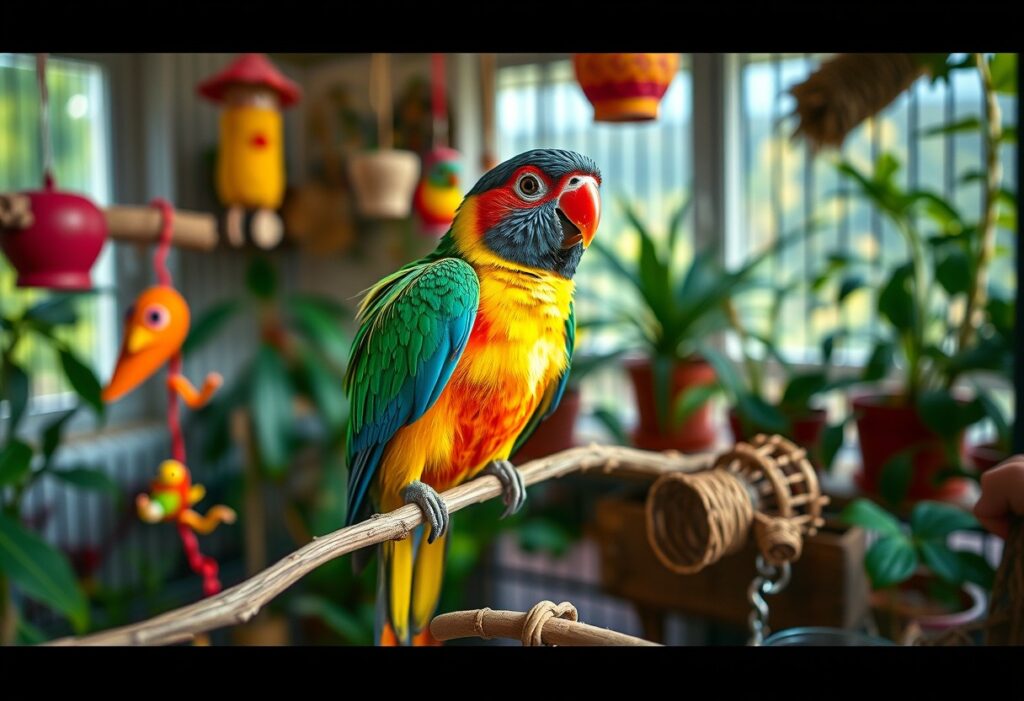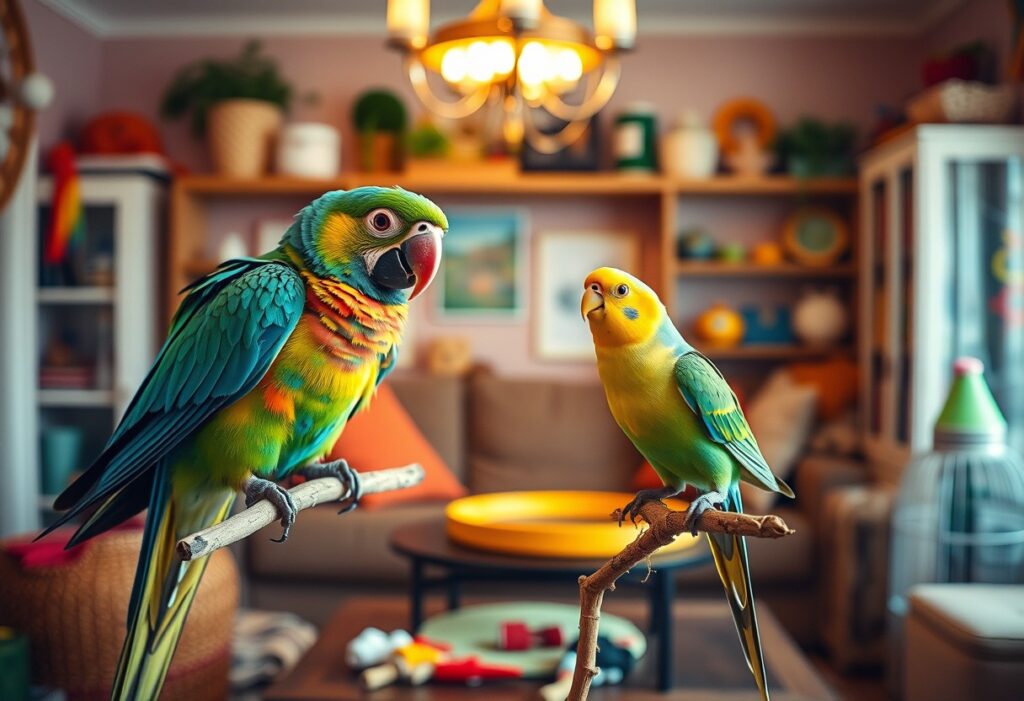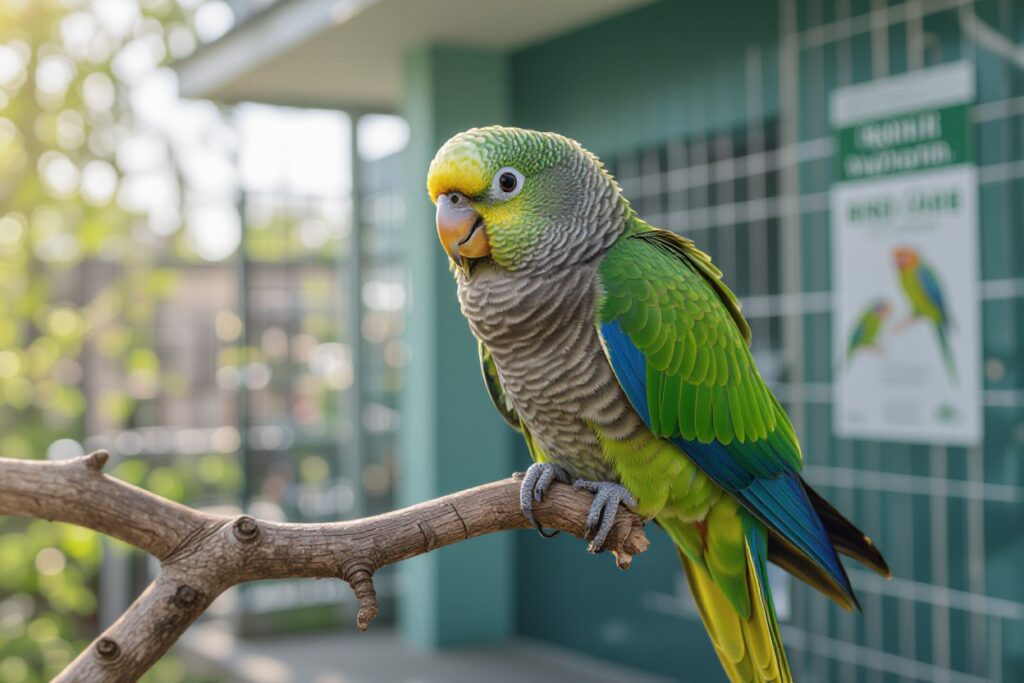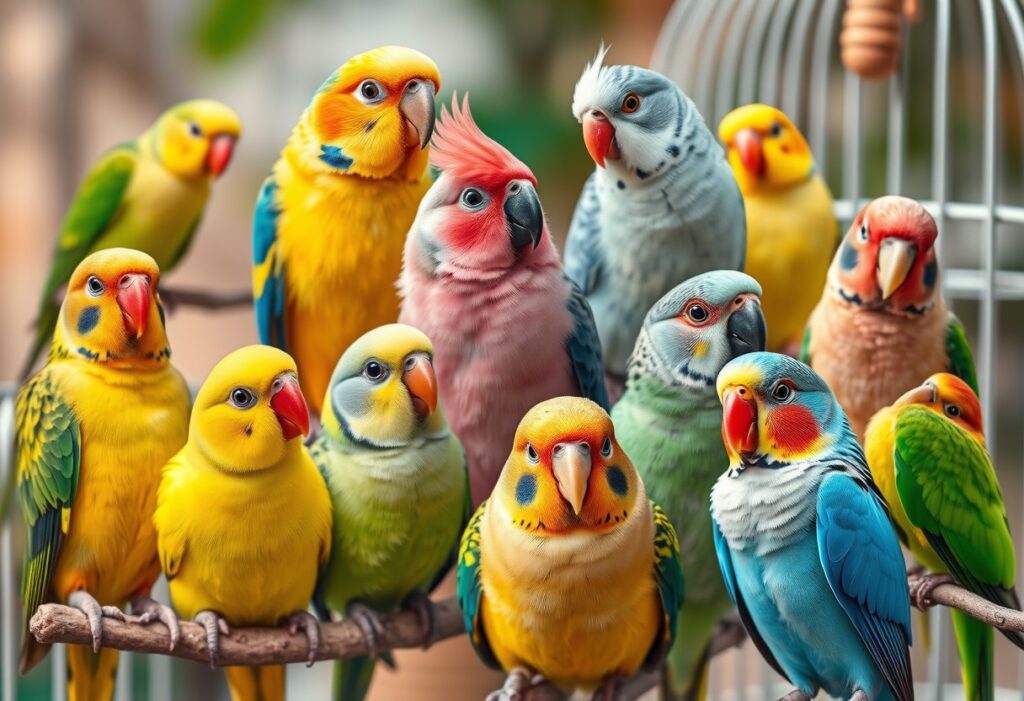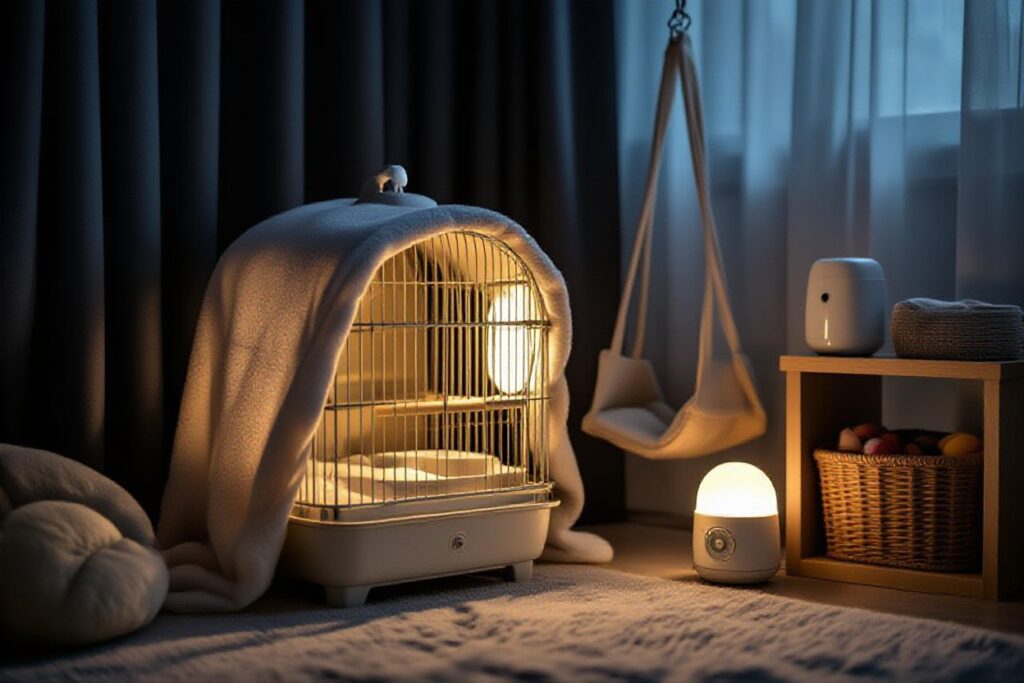Expectations about the lifespan of pet birds can vary significantly among different species, and understanding these differences is crucial for your long-term care plans. Typically, smaller birds like parakeets may live around 5 to 10 years, while larger parrots can thrive for 20 to 80 years, depending on their species and health care. Factors such as diet, environment, and social interactions play a key role in their longevity. By being informed about your bird’s potential lifespan, you can make better choices that contribute to a fulfilling life for both you and your feathered friend.
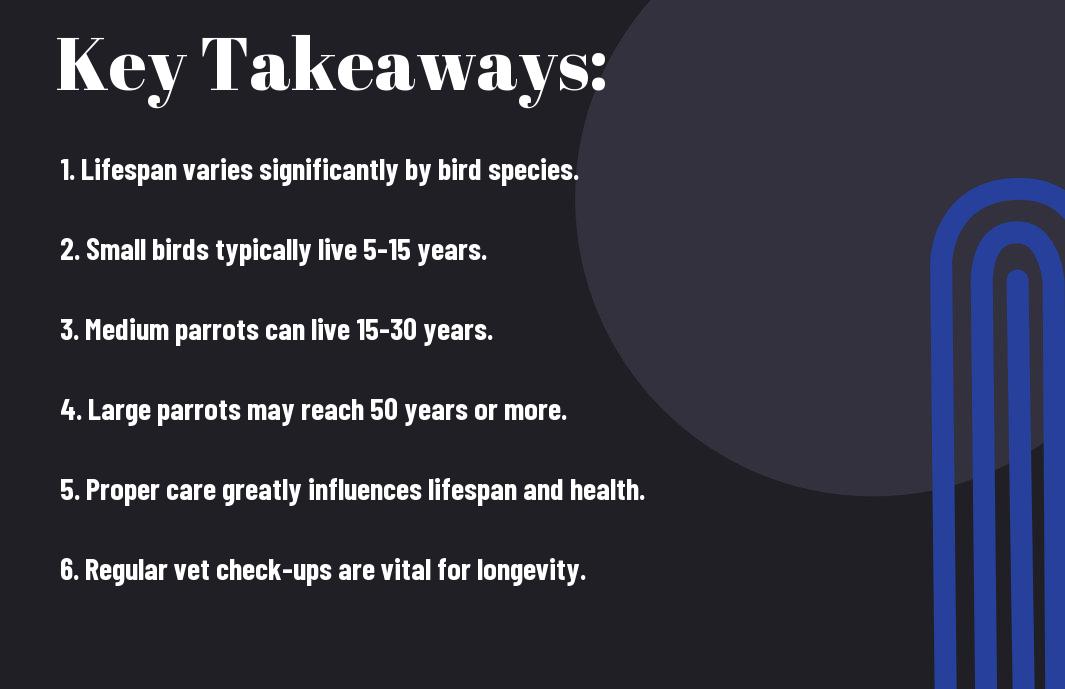
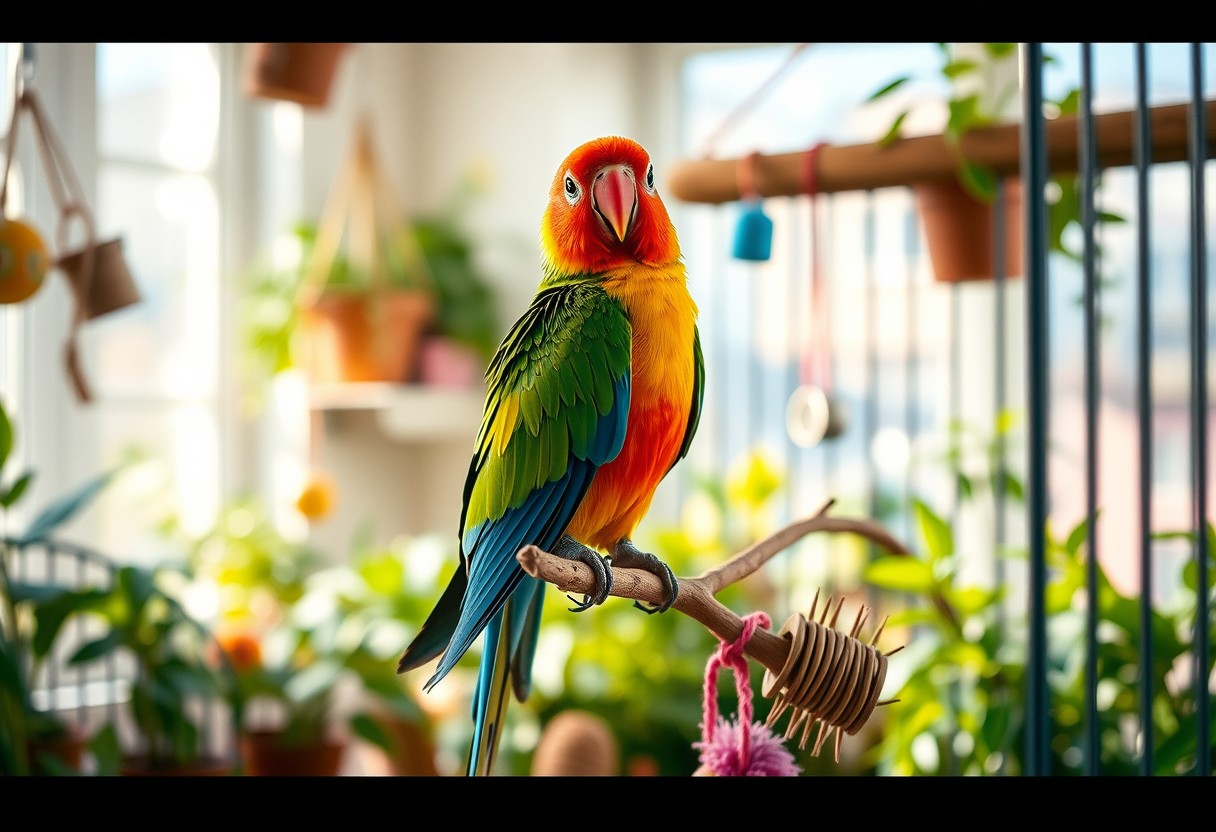
Understanding Bird Lifespan
Before plunging into the specifics of pet bird lifespans, it’s crucial to recognize that the longevity of your avian friend can greatly vary. The lifespan of pet birds is influenced by various factors, including species, diet, environment, and healthcare. Understanding what affects their lifespan will help you provide the best possible care for your feathered companion.
Factors Influencing Lifespan
Birds, like all animals, experience different lifespans based on a multitude of factors. A key aspect to consider is the type of species you choose. While some birds are known for their long lifespans, others may only live for a few years. Additionally, the quality of nutrition you provide can significantly impact their overall health and longevity. Proper diets rich in vitamins and minerals are crucial for a flourishing life.
- Species type
- Diet quality
- Living environment
- Healthcare access
- Social interactions
Moreover, ensuring your pet has a stimulating environment and opportunities for social interaction can lead to a happier and healthier bird. Thou must be proactive in addressing these factors to help maximize your bird’s lifespan and quality of life.
Common Pet Bird Species and Their Lifespan
Lifespan expectations can vary dramatically among different pet bird species. For instance, while budgerigars (commonly known as budgies) typically live around 5 to 10 years, larger parrots like macaws can live anywhere from 30 to 50 years, depending on their care. Other popular species, like cockatiels, generally live about 10 to 15 years, while African greys might average around 20 to 30 years of life.
This information is crucial if you want to choose a pet bird that fits into your lifestyle and long-term commitments. Fostering your bird’s well-being entails understanding these species-specific lifespans and recognizing that their care requirements increase with age. As a responsible bird owner, focusing on nutritious dietary practices and frequent vet check-ups can positively influence your pet’s well-being. Make sure to also provide mental and physical stimulation through toys and social interaction, as this can significantly enhance their quality of life. Recall, the better you care for your bird, the longer they can be a part of your family.
Nutrition and Its Impact
Clearly, nutrition plays a pivotal role in the overall health and lifespan of your pet bird. A well-balanced diet is crucial not just for maintaining energy levels, but also for ensuring that your feathered friend thrives in a nurturing environment. When you feed your bird a diverse selection of foods, you are providing them with the necessary nutrients that support their immune system, help in feather maintenance, and contribute to optimal organ function.
Importance of a Balanced Diet
To truly understand the importance of a balanced diet for your pet bird, consider that their nutritional needs can vary greatly depending on their species, age, and health status. A diet rich in vitamins, minerals, and proper proteins not only fosters physical well-being but also enhances cognitive abilities and behavioral health. Birds in the wild consume a varied diet that naturally provides all the necessary nutrients; replicating this in captivity is crucial for their long-term health.
Incorporating a mixture of high-quality pellets, fresh fruits, and vegetables into your bird’s diet can significantly impact their vitality. This diverse menu ensures your feathered companion gets the vital nutrients they require, making them less susceptible to diseases and increasing their lifespan. Bear in mind, a healthy diet leads to a vibrant bird who exhibits playful behavior and a happy disposition.
Common Nutritional Deficiencies
On the other hand, neglecting your bird’s dietary needs can result in a myriad of nutritional deficiencies that may pose serious threats to their health. Common deficiencies often include a lack of crucial vitamins like Vitamin A, calcium, and Vitamin D, which are crucial for maintaining healthy skin, a strong skeletal structure, and overall metabolic functioning. These deficiencies can lead to conditions such as metabolic bone disease and other health issues that may drastically shorten your bird’s lifespan.
This highlights the importance of being vigilant in monitoring your pet bird’s diet and ensuring it contains all necessary nutrients. By recognizing the signs of nutritional deficiencies, such as feather plucking, lethargy, or poor beak condition, you can take proactive measures to amend their diet. Providing a well-rounded nutritional plan not only guarantees your bird’s well-being but also fosters a stronger bond between you and your avian companion. Bear in mind, the right diet can significantly affect your pet bird’s health and longevity, so be diligent in your feeding practices.
Environmental Considerations
After bringing a pet bird into your home, it’s crucial to create an environment that promotes their overall wellbeing and longevity. Pet birds are highly sensitive creatures, and their lifespan can be significantly affected by the conditions they live in. As a responsible owner, understanding the factors that contribute to the ideal habitat for your feathered friend will not only enhance their quality of life but allow you to enjoy countless years together.
Ideal Living Conditions
Any pet bird requires a carefully constructed habitat that mirrors their natural environment as closely as possible. This means providing a spacious cage that allows for movement and exercise, along with perches, toys, and safe materials for chewing. It’s crucial to position the cage away from drafts and direct sunlight, ensuring your bird is comfortable at all times. Additionally, using non-toxic cleaning products and ensuring the air quality is free from harmful pollutants will keep your bird healthy and happy, further extending its lifespan.
Choosing the right substrate for the bottom of the cage can also make a significant difference. Avoid using sandpaper or cedar shavings, which can be harmful to your bird’s feet and respiratory health, respectively. Instead, opt for paper-based products or safe, soft bedding that makes cleanup easy while providing comfort for your pet. Regularly changing and cleaning the cage can prevent the growth of bacteria and fungi, further ensuring a safe living environment.
The Role of Social Interaction
One of the most significant aspects of a pet bird’s life is their need for social interaction. As highly social animals, many birds will thrive when they have regular engagement with their human guardians or other birds. While some species may be more independent, most will flourish in environments where they feel included and interacted with on a daily basis. This nurturing environment not only satisfies their emotional needs but can also enhance their physical health, often leading to longer lifespans.
To maximize your bird’s wellbeing, schedule daily interaction routines, such as talking, playing, or even letting them out of their cage under supervision. The emotional connection you build will help foster trust and reduce stress in your bird. In fact, a lack of social interaction can lead to behavioral issues and stress-related health problems. Be mindful that isolation, whether from other birds or humans, can pose significant risks to your bird’s overall health and happiness.
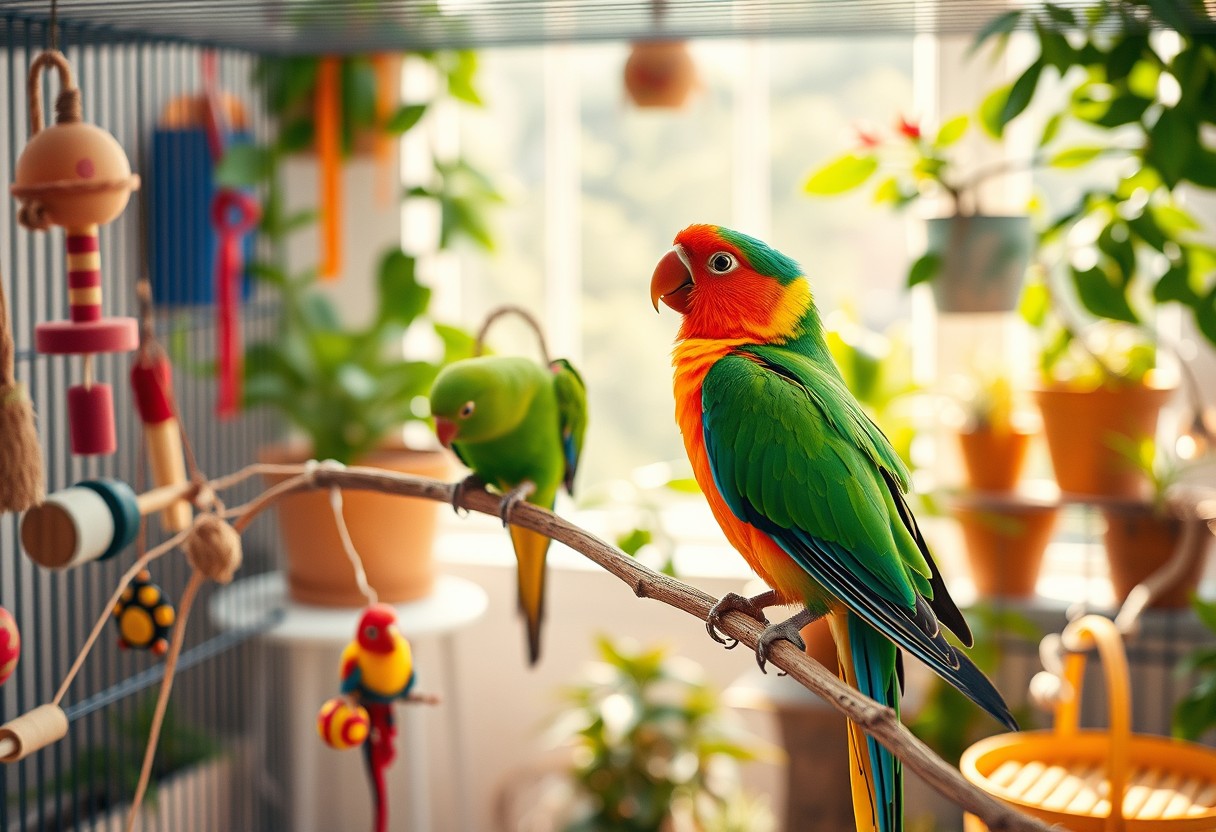
Health and Veterinary Care
All pet birds require consistent attention to their health and well-being. As an owner, it is imperative for you to be proactive about your bird’s health to ensure a long and thriving life. Regular veterinary care is vital because avian biology can be complex, and many health issues can go unnoticed until they become serious. Establishing a relationship with a veterinarian who specializes in bird care is one of the best ways to keep your feathered friend healthy.
Regular Health Check-ups
To keep your pet bird in optimal health, scheduling regular health check-ups is crucial. Ideally, you should take your bird for a veterinary visit at least once a year, although some birds may require more frequent visits depending on their age or health conditions. During these check-ups, your veterinarian will examine your bird’s overall well-being, check for signs of disease, and assess nutritional requirements. This proactive approach allows for early detection of any potential issues, which can significantly increase your bird’s lifespan.
During these visits, the veterinarian will also provide you with important information about your bird’s care, diet, and living conditions. It’s an excellent opportunity for you to ask questions and clarify any concerns you may have about your bird’s health or behavior. Remember that early intervention can be key in managing health conditions, and regular monitoring can help you identify changes that may signal a problem.
Preventive Measures and Vaccinations
Preventive measures are imperative in maintaining your bird’s health and enhancing its lifespan. As a responsible bird owner, you should ensure that your pet receives the appropriate vaccinations to protect against common avian diseases. Birds are susceptible to conditions like Psittacosis, Paramyxovirus, and Avian Influenza, which can be severe or even fatal. Consult your avian veterinarian about which vaccines your specific breed may need and the recommended vaccination schedule.
Vaccinations play a pivotal role in preventing the onset of serious illnesses. They act as a shield against diseases that could compromise your bird’s health. In some cases, regular check-ups may coincide with vaccination appointments, making it easier for you to manage your bird’s veterinary care. Additionally, integrating good hygiene practices, providing a balanced diet, and maintaining a stress-free environment will also contribute to your bird’s overall health. By taking these preventive steps, you ensure your pet enjoys a longer, happier life in your care.
Conclusion
With this in mind, understanding the lifespan of pet birds is crucial for you as a prospective or current bird owner. Different species come with varying life expectancies, and knowing these can help you make informed decisions about the care and environment you provide for your feathered friend. As you research the specific needs and typical lifespans of the bird species you are considering, you’ll be better equipped to create a fulfilling life for your pet. Furthermore, acknowledging factors that can affect lifespan, such as diet, habitat, and social interaction, empowers you to enhance your bird’s quality of life.
Ultimately, your commitment to understanding and meeting the needs of your pet bird not only supports their well-being but also enriches your experience as a pet owner. Whether you are welcoming a small canary or a larger parrot into your home, being knowledgeable about their lifespan and care requirements will lead to a rewarding relationship that can last for years, if not decades. By prioritizing your bird’s needs, you will contribute to a happy, healthy life for your avian companion.
FAQ
Q: What factors influence the lifespan of pet birds?
A: The lifespan of pet birds can be influenced by several factors, including species, genetics, diet, and living conditions. Different species of birds have varying lifespans; for example, smaller birds like budgerigars may live around 5 to 10 years, while larger parrots can live anywhere from 20 to over 60 years. Genetics also play a role, as some individual birds may have predispositions to certain health issues. Additionally, a balanced diet rich in nutrients and access to clean water greatly impact health and longevity. Moreover, environmental factors, including the bird’s living conditions, social interaction, and mental stimulation, are crucial for ensuring a long and healthy life.
Q: How can I ensure my pet bird lives a long, healthy life?
A: To help your pet bird enjoy a long and healthy life, it’s crucial to provide a proper diet that includes a variety of seeds, pellets, fruits, and vegetables. Regular veterinary check-ups are important for preventive care and early detection of health issues. A spacious and safe cage is crucial for their physical well-being, providing enough room for exercise and play. Additionally, social interaction either with humans or other birds is vital for their mental health. Finally, engaging toys and activities can help stimulate their minds and prevent boredom, leading to a happier and healthier bird.
Q: What are some common health issues that can affect a bird’s lifespan?
A: Common health issues that can affect a bird’s lifespan include obesity, respiratory problems, feather plucking, and avian infections. Obesity often results from an improper diet and lack of exercise, leading to other complications such as heart disease. Respiratory issues can arise due to exposure to smoke, dust, or harmful chemicals in their environment. Feather plucking may indicate stress, boredom, or an underlying health condition. Additionally, avian infectious diseases can be detrimental to their health and should be addressed with a veterinarian. Regular health checks and awareness of these potential issues can help address problems early and extend a bird’s lifespan.
